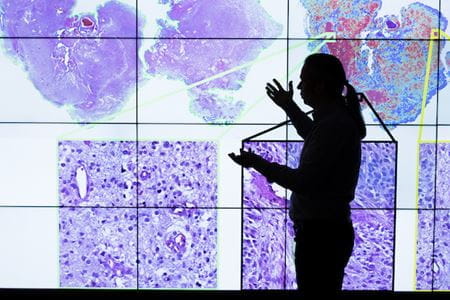INDIANAPOLIS — A new project by a team of researchers across the nation analyzes the ways in which digitized health data, artificial intelligence models and other recent technological advancements have changed how cancers are diagnosed, studied and treated.
Co-led by Indiana University School of Medicine's Spyridon Bakas, PhD, and University of Maryland’s Elana Fertig, PhD, the team's findings were recently published in the Cancer Research Journal of the American Association for Cancer Research.
"Informatics and AI are being used in every part of the clinical data extracted from cancer patients, from medical imaging to electronic health records, lab results, blood tests and molecular profiling, to expedite diagnoses," said Bakas, senior corresponding author of the article, an associate professor and division chief in the IU School of Medicine's Department of Pathology and Laboratory Medicine, and a researcher within the IU Melvin and Bren Simon Comprehensive Cancer Center.
AI models have been trained to identify cancerous cells in tissue that humans may not be able to perceive with the naked eye, while also scanning data repositories for relevant information at a much faster rate than any human researcher, the paper notes.
Finally, AI can identify patterns by analyzing vast quantities of data in ways previously not possible.
But oncologists and human researchers are still needed.
"AI could be used to help with faster triaging of known cases, but the human oncologist will be essential to approve and access rare cases that are not well represented in the AI models' training," Bakas said.
Developing standardized methodology for these informatics procedures will be necessary, the article says, as will growing the databases to better train the models and developing software tools that will allow researchers to access the information.
Bakas was joined by nearly two dozen co-authors from universities and institutes around the country, including the University of Maryland, Johns Hopkins University and Harvard University.
"Cancer Informatics is an expanding field with the rapid emergence of increasingly high-resolution, high-dimensional, multiomic datasets," said Kathleen Noller, PhD, lead author and postdoctoral fellow at the Institute for Genome Sciences at the UMD School of Medicine. "This review illuminates cutting-edge methods in cancer biology, as well as their drawbacks and some areas for improvement. Ultimately these technologies will help in predictive and precision care for cancer patients."
Other authors joining Bakas and Noller on the paper include:
Sarthak Pati of the IU School of Medicine; Taxiarchis Botsis, Rachel Karchin, Jiaying Lai and Lauren Ciotti of Johns Hopkins; Pablo G. Camara of University of Pennsylvania; Lee A.D. Cooper of Northwestern University; Jeremy Goecks of the Moffitt Cancer Center; Malachi Griffith and Daniel Marcus of Washington University; Brian J. Haas of Broad Institute; Trey Ideker, Dexter Pratt, Michael Reich and Bjoern Peters of University of California San Diego; Despina Kontos of Columbia University; Clifford A. Meyer of the Harvard T.H. Chan School of Public Health; Kristen Naegle of the University of Virginia; Benjamin J. Raphael of Princeton University; Guergana K. Savova of Harvard Medical School; Carrie Wright of the Fred Hutchinson Cancer Center; and Elana J. Fertig of the University of Maryland.
This research was funded by the National Cancer Institute of the National Institutes of Health.
About the Indiana University School of Medicine
The IU School of Medicine is the largest medical school in the U.S. and is annually ranked among the top medical schools in the nation by U.S. News & World Report. The school offers high-quality medical education, access to leading medical research and rich campus life in nine Indiana cities, including rural and urban locations consistently recognized for livability. According to the Blue Ridge Institute for Medical Research, the IU School of Medicine ranks No. 13 in 2024 National Institutes of Health funding among all public medical schools in the country.
Writer: Rory Appleton, rapplet@iu.edu
For more news, visit the IU School of Medicine Newsroom: medicine.iu.edu/news




